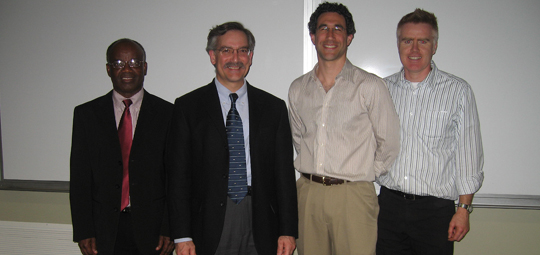Engineering Now .: Volume 4 - Edition 7 .: April 2008
2008 Henry Darcy Lecture in Ground Water Science

Wednesday, April 23, 2008
According to the National Ground Water Association website, the atmospheric concentration of carbon dioxide on earth is at the highest level it has been in 500,000 years.
Many people believe that increased carbon dioxide levels in the atmosphere are linked the phenomenon of global warming, and much of the increase is thought to be due to human activity. Progress may be part of what led to this growing problem, and now researchers are turning back to science for possible solutions.
On Wednesday, April 23, the Department of Civil & Environmental Engineering was pleased to present the 2008 Henry Darcy Lecture Series in Ground Water Science. This year’s speaker, Dr. Michael Celia, chair of the Department of Civil and Environmental Engineering at Princeton University, spoke about the technique known as “Geological Storage”, which involves the capturing of CO2 before it reaches the atmosphere, and subsequently injecting it into deep geological formations.
The lecture, entitled, “Geological Storage as a Carbon Mitigation Option", covered the attractive elements of this strategy as well as potential challenges scientists may face in trying to implement it.
One risk factor associated with injecting carbon dioxide underground is the possibility of leakage. The impact of storing massive amounts of carbon dioxide in this manner is not fully understood. Dr. Celia and his team have spent time trying to
ascertain possible outcomes, so as to reduce the risk be better able to help governments formulate safe regulations for the practice.
"This is all about not putting ourselves at risk for unintended
consequences," he told a room full of faculty, staff and students from
across campus.
But Dr. Celia didn't pull any punches in his assessment of the looming carbon crisis faced by the planet, and the potential cost of inaction. He acknowledged the fact that all solutions will have their costs and challenges, but impressed upon the crowd that doing nothing at all is the worst outcome.
"There's no way you're going to solve this problem without a huge effort. That's just a given," he said. "Technologies exist to solve the carbon problem, but all of them require huge effort. There's no point in kidding ourselves."
He added that he didn't want to be back at Western in ten years lecturing
about the same problem.
Dr. Celia ended his talk with optimism, remarking that he felt the issues are not insurmountable.
"The problem can be solved," he said. "It needs intelligent and reasonable people to go an solve it."
On-hand for official welcomes and introductions were Dr. Hesham El Naggar (Associate Dean, Research), Dr. Ernest Yanful (Chair of the Department of Civil and Environmental Engineering) and Assistant Professor Denis O'Carroll.
The Darcy Lecturer series was established in 1986 and has since reached over 70,000 ground water students, faculty members, and professionals. Each year, an internationally renowned researcher is sponsored to speak around the world by the US National Ground Water Association. The series honors Henry Darcy of France, for his scientific discoveries of 1856, which established the physical basis upon which ground water hydrogeology would be studied in the future.
Also from this web page:
Contact
.: Becky Blue
Spencer Engineering Building, Room 2074
Telephone: (519) 850-2917 Fax: (519) 661-3808
contactwe@eng.uwo.ca


